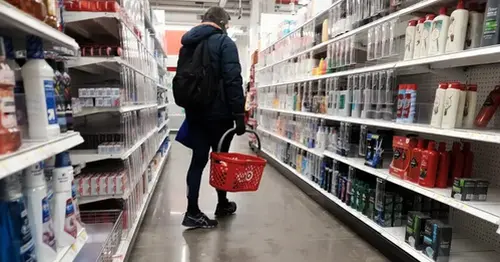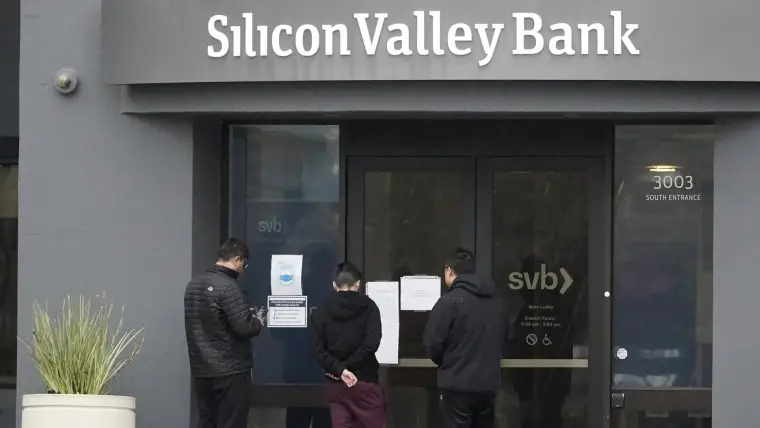
Shrinking savings and rising debt leave consumers on shaky financial footing
WASHINGTON — U.S. households have been whittling down their savings and taking on increasing amounts of debt, putting many in a weaker position to weather an economic downturn that has grown all the more likely following recent turmoil in the banking industry.
Fears of a slowing economy were renewed this week when U.S. regulators took over Silicon Valley Bank, Swiss officials stepped in to shore up the finances of Credit Suisse, and a group of Wall Street firms threw a lifeline to First Republic Bank.
The events drew parallels to the 2008 financial crisis and are likely to cause banks to tighten up their lending, putting added pressure on already strained consumers, which could in turn cause them to pull back on spending and trigger layoffs at companies facing declining sales.
“What we’re seeing right now, in terms of the stress of the banking sector, will likely have amplifying effects on the deterioration of household finances,” said Gregory Daco, chief economist at EY-Parthenon. “We are likely to see an environment in which banks are more cautious with their lending, especially smaller regional banks, and that will further exacerbate the softening that we were already seeing.”
Goldman Sachs on Thursday increased its odds of a recession by 10 percentage points, to 35%. Other economists are even less optimistic the U.S. will be able to avoid an economic downturn, with those surveyed by Bloomberg putting the odds of a recession at 60%.
Over much of the past year, as inflation has hit its highest levels in decades, consumers have largely been able to keep increasing their spending. While retail sales declined slightly in February compared to January, there were still up 5.4% from a year earlier, the Commerce Department reported this week.
Bank of America credit and debit card data from February showed spending per household up 2.7% year-over-year, which “suggests to us that consumer spending remains resilient even as the rate of spending growth moderates,” according to a report last week from the Bank of America Institute.
Regulators say Silicon Valley Bank customers will have access to their money following collapse
March 13, 202305:06But data indicates that wages haven’t kept up with inflation over that period. As a result, Americans have increasingly turned to their credit cards and savings accounts to keep up their spending habits.
“The average person’s finances were probably better a year or two ago than they are now just because they were more flush with cash and had less debt,” said Ted Rossman, a senior industry analyst at Bankrate.com. “There was a time in early '21 that credit card balances were 17% lower than they were prior to the pandemic. And now they’re up 28% from that low point.”
Americans have spent down about half of the savings they accumulated during the pandemic, going from about $2.1 trillion in excess savings from the influx of government stimulus checks and reduced spending during lockdowns to around $900 billion as of the third quarter last year, according to a report by J.P. Morgan.
At the same time, the percentage of people’s paycheck going into savings has fallen to about half of what it was prior to the pandemic, according to data from the Federal Reserve Bank of St. Louis.
Meanwhile, the amount of debt Americans are carrying has soared. Credit card balances increased by $61 billion to a record high of $986 billion in the last quarter of 2022 — a rapid reversal from two years ago when Americans were paying down debt with stimulus checks, according to data from New York Federal Reserve. Auto loan balances rose by $94 billion.
There are signs that a growing number of consumers have been having a harder time paying down that debt.
The percentage of credit card holders carrying debt from month to month has increased to 46%, up from 39% a year ago, according to Bankrate. Auto loan delinquencies have been steadily rising from their pandemic lows with the share of auto loans at least 60 days overdue at its highest level since 2006, according to a report last month from Cox Automotive.
All those factors have investors, economists and corporate executives closely watching what moves the Federal Reserve will make on interest rates next week. Another round of rate increases would make it costlier for consumers to borrow money to finance a home or buy a car, or to carry a balance on their credit cards. It will also put pressure on businesses looking to borrow money.
But with inflation persistently high — up 6% in February from a year earlier — some economists say the Federal Reserve has no choice but to continue hiking rates to tamp down spending.
Another key factor economists say they are watching is the job market, which has remained strong in part because consumers have kept up their spending.
Job creation slowed in February but was still stronger than expected, with the economy adding 311,000 jobs, the Labor Department reported last week. The unemployment rate rose to 3.6%, relatively in line with where it’s been for the past year. But even a slight uptick in unemployment could cause millions of Americans to pull back on their spending.







